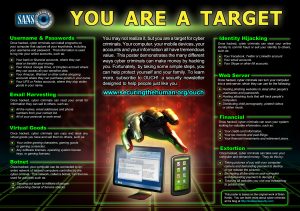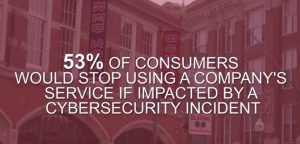
This week kicks off National Cybersecurity Awareness Month (NCSAM) which is well needed in light of the recent mega data breaches. Security awareness is becoming more important as consumers are now demanding more security from the organizations they do business with. Yet, it is important to remember cybersecurity is a shared responsibility. When was the last time you thought about taking control of your own security and privacy posture?
Take immediate action with these simple quick fix steps:
Think Like A Cybercriminal
 Take inventory of the information a cybercriminal would want. (banking, credit cards, SSN, healthcare, etc.) What are you doing to protect it? Ensure you are backing up any important data offline so if you are impacted by ransomware you are prepared. Clean up your social media accounts by both checking your privacy settings and delete older posts that might compromise your personal information. When you are shopping online think about the information you are providing – would you give it to a clerk at a register? If not, don’t provide it online. Check to see if your information is already being sold in the dark web. Ultimately, by doing this, it will allow you to stop fraud before it happens, reducing identity theft and account takeover.
Take inventory of the information a cybercriminal would want. (banking, credit cards, SSN, healthcare, etc.) What are you doing to protect it? Ensure you are backing up any important data offline so if you are impacted by ransomware you are prepared. Clean up your social media accounts by both checking your privacy settings and delete older posts that might compromise your personal information. When you are shopping online think about the information you are providing – would you give it to a clerk at a register? If not, don’t provide it online. Check to see if your information is already being sold in the dark web. Ultimately, by doing this, it will allow you to stop fraud before it happens, reducing identity theft and account takeover.
Step It Up
Many organizations you do business with now offer simple, convenient and secure step up authentication options– why are you not using it? It typically is a very simple process to activate and use.
Resist The Click
With all the high tech attacks, the number one vulnerability is still humans. RSA’s Anti-Fraud Command Center identifies a new phishing attack every 30 seconds and many of them are now linked to ransomware. The velocity of phishing attacks combined with us letting our guard down while engaging in many digital channels makes us more vulnerable than ever. This is why it is critical when you get a text, email or see a link to a video on social media, take caution before you click.
Be On Alert
 Since most of us don’t proactively check our statements every day, set up these alerts to simplify your monitoring process: activate fraud alerts on all your financial and health related accounts. Examples of the types of alerts many organizations offer are: a new payee, money withdrawal, high value credit card transaction, insurance claim submitted, use of hospitality loyalty points or a new healthcare record. Also, you should consider signing up for a security credit freeze with credit bureaus like Equifax, Experian , TransUnion
Since most of us don’t proactively check our statements every day, set up these alerts to simplify your monitoring process: activate fraud alerts on all your financial and health related accounts. Examples of the types of alerts many organizations offer are: a new payee, money withdrawal, high value credit card transaction, insurance claim submitted, use of hospitality loyalty points or a new healthcare record. Also, you should consider signing up for a security credit freeze with credit bureaus like Equifax, Experian , TransUnion
Clean Your House
Chances are that you use the same password for many of your accounts. With the frequency of data breaches and malware capable of stealing your passwords, it is more important how often you change your passwords, not how strong they are. Consider making it a sentence so it will be easier to remember. Also, take a moment and look around and evaluate all your interconnected devices: your watch, phone, tablet, toy, car, light, printer, thermostat, drones, gaming console, etc, We live in an IOT world and need to adapt to it. Any new device you get start by changing the default user names and passwords, installing security updates and turning off devices when not in use.
Cybercrime dramatically impacts our entire economy and our personal and professional lives.
We all must share responsibility to defending our digital universe – take time to join the good fight! Learn how by following us on @RSASecurity.